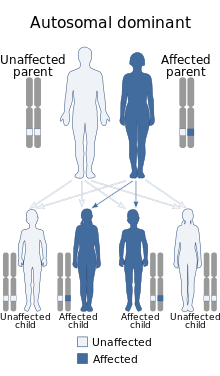Atelosteogenesis type I is a rare autosomal dominant condition.[1] This condition is evident at birth and is associated with a very poor prognosis for the baby. It may be diagnosed antenatally.
| Atelosteogenesis type I | |
|---|---|
| Other names | Spondylo-humero-femoral dysplasia |
 | |
| Autosomal dominant pattern is the inheritance manner of this condition | |
| Specialty | Medical genetics |
Signs and symptoms
editClinical features include[2]
- Abnormal facies
- Prominent forehead
- Hypertelorism
- Depressed nasal bridge with a grooved tip
- Micrognathia
- Cleft palate
- Severe short limbed dwarfism
- Joint dislocations (hip, knee and elbow joints)
- Club feet
- Cardiorespiratory failure
Cardiorespiratory failure is due to pulmonary hypoplasia or tracheobronchial hypoplasia.[3]
Causes
editThis condition is caused by mutations in the filamin B (FLNB) gene.[4][5][6]
Diagnosis
editThis condition is evident at birth and may be diagnosed antenatally with ultrasound or magnetic resonance imaging. The infants may be still born. Those that are live born do not survive long.[7]
Radiological findings include[8]
- Severe platyspondyly
- Distally tapered, shortened, incomplete or absent humeri and femurs
- Shortened or bowed radii, ulnas and tibias
- Hypoplastic pelvis and fibulas
- Deficient ossification of the metacarpals, middle and proximal phalanges
Differential diagnosis
editThis includes[9]
Treatment
editThis section is empty. You can help by adding to it. (July 2024) |
Epidemiology
editThis section is empty. You can help by adding to it. (July 2024) |
History
editThis condition was first described by Maroteaux et al. in 1982.[10]
References
edit- ^ Sillence, D.; Worthington, S.; Dixon, J.; Osborn, R.; Kozlowski, K. (1997-05-13). "Atelosteogenesis syndromes: a review, with comments on their pathogenesis". Pediatric Radiology. 27 (5). Springer Science and Business Media LLC: 388–396. doi:10.1007/s002470050154. ISSN 0301-0449. PMID 9133349.
- ^ Temple, K; Hall, C A; Chitty, L; Baraitser, M (1990-03-01). "A case of atelosteogenesis". Journal of Medical Genetics. 27 (3). BMJ: 194–197. doi:10.1136/jmg.27.3.194. ISSN 1468-6244. PMC 1017004. PMID 2325095.
- ^ Wessels, Annasu; Wainwright, Helen C.; Beighton, Peter (2011). "Atelosteogenesis Type I: Autopsy Findings". Pediatric and Developmental Pathology. 14 (6). SAGE Publications: 496–500. doi:10.2350/11-01-0969-cr.1. ISSN 1093-5266. PMID 21985323.
- ^ Farrington-Rock, Claire; Firestein, Marc H.; Bicknell, Louise S.; Superti-Furga, Andrea; Bacino, Carlos A.; Cormier-Daire, Valerie; Le Merrer, Martine; Baumann, Clarisse; Roume, Joelle; Rump, Patrick; Verheij, Joke B.G.M.; Sweeney, Elizabeth; Rimoin, David L.; Lachman, Ralph S.; Robertson, Stephen P.; Cohn, Daniel H.; Krakow, Deborah (2006). "Mutations in two regions ofFLNBresult in atelosteogenesis I and III". Human Mutation. 27 (7). Hindawi Limited: 705–710. doi:10.1002/humu.20348. ISSN 1059-7794. PMID 16752402.
- ^ Li, Ben C.; Hogue, Jacob; Eilers, Meg; Mehrotra, Pavni; Hyland, James; Holm, Tara; Prosen, Tracy; Slavotinek, Anne M. (2013). "Clinical report: Two patients with atelosteogenesis type I caused by missense mutations affecting the same FLNB residue". American Journal of Medical Genetics Part A. 161 (3): 619–625. doi:10.1002/ajmg.a.35792. ISSN 1552-4825. PMID 23401428.
- ^ Jeon, Ga Won; Lee, Mi-Na; Jung, Ji Mi; Hong, Seong Yeon; Kim, Young Nam; Sin, Jong Beom; Ki, Chang-Seok (2014-03-01). "Identification of a De Novo Heterozygous Missense FLNB Mutation in Lethal Atelosteogenesis Type I by Exome Sequencing". Annals of Laboratory Medicine. 34 (2): 134–138. doi:10.3343/alm.2014.34.2.134. ISSN 2234-3806. PMC 3948826. PMID 24624349.
- ^ Stevenson, R.E; Wilkes, G (1983). "Atelosteogenesis with survival beyond the neonatal period". Proc. Greenwood Genet. Center 2: 32–38.
- ^ Ueno, Kazunori; Tanaka, Mamoru; Miyakoshi, Kei; Zhao, Chen; Shinmoto, Hiroshi; Nishimura, Gen; Yoshimura, Yasunori (2002-10-24). "Prenatal diagnosis of atelosteogenesis type I at 21 weeks' gestation". Prenatal Diagnosis. 22 (12). Wiley: 1071–1075. doi:10.1002/pd.470. ISSN 0197-3851. PMID 12454961.
- ^ Nishimurae, Gen; Horiuchi, Takashi; Kim, Ok H.; Sasamoto, Yuka (1997-12-12). "Atypical skeletal changes in otopalatodigital syndrome type II: Phenotypic overlap among otopalatodigital syndrome type II, boomerang dysplasia, atelosteogenesis type I and type III, and lethal male phenotype of Melnick-Needles syndrome". American Journal of Medical Genetics. 73 (2): 132–138. doi:10.1002/(SICI)1096-8628(19971212)73:2<132::AID-AJMG6>3.0.CO;2-W. PMID 9409862.
- ^ Maroteaux, P.; Spranger, J.; Stanescu, V.; Le Marec, B.; Pfeiffer, R. A.; Beighton, P.; Mattei, J. F.; Opitz, John M. (1982). "Atelosteogenesis". American Journal of Medical Genetics. 13 (1). Wiley: 15–25. doi:10.1002/ajmg.1320130106. ISSN 0148-7299. PMID 7137218.